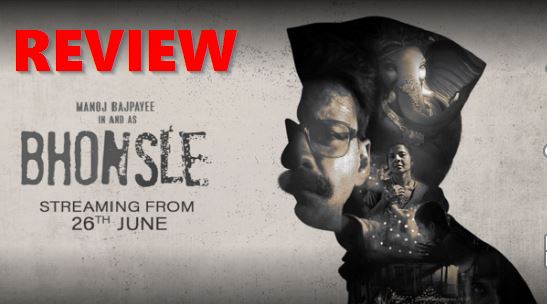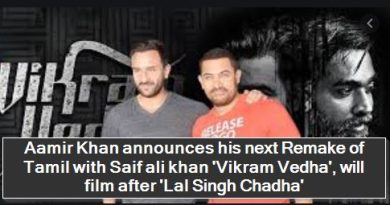Bhonsle movie review – manoj Bajapyee in Maharashtra’s insider and outsider fight
The makers of the film ‘Bhonsle’ announced the nationwide release of the film on the OTT platform Sony Liv. The film has been released. ‘Bhonsle’ is an old Marathi sub-inspector’s film, which has just retired against its will. Bhonsle is a rare type of policeman who protects the law and the common man, who has a more favorable human condition than the manual, and this is his greatest strength that makes him strong from within.
Bhonsle’
Cast: Manoj Bajpayee, Santosh Juvekar, Ipshita Chakraborty Singh, Virat Vaibhav, Abhishek Banerjee, Rajendra Sisadar, Kailash Waghmare, Shrikant Yadav, Neetu Pande
Director: Devashish Makhij
Duration: One hour 58 minutes
Stars: 3/5
Where to Watch: Sony Liv
‘Bhonsle‘ Story:
A retired cop (Ganpat Bhonsle, played by Manoj Bajpayee) is surrounded by a man with political aspirations trying to get rid of migrants. While the cop neither supports nor revolts standing strong with the affiliate, he happens to befriend a North Indian girl and her brother. Soon, they find themselves in a sutuation from which there is no turning back.
Bhonsle is a constable in the Mumbai police. The film begins with his retirement, a quiet, unassuming affair juxtaposed against the preparation of the Ganpati idol for the festival of Ganesh Chaturthi. This sequence beautifully sets the tone for the rest of the film. He goes back to his little room in a chawl and his quiet existence, alone and aloof.
The ramshackle chawl plays host to people of differing ethnicities and Vilas, a taxi driver, wants to exploit these for a political career. Throughout the film, he tries to rake up anger within the Marathis against those he considers the others, the Bihari migrants. Bhonsle plays scant regard to him, or anyone else; engrossed in his monotonous day-to-day existence, he simply observes, hardly speaking a word unless necessary. But when a young Bihari woman moves into the chawl along with her kid brother and Vilas’ growing desperation leads to increasingly wicked acts, Bhonsle’s reticence faces its most stringent test.
Makhija’s flirtations with cinematic ambition are tempered by a grounded, bottoms-up approach to filmmaking that remains the most thrilling aspect of the film. The two-hour-long film plays out over the course of the Ganpati festival. For anyone acquainted with the director’s previous work, the dance sequences plucked from the celebrations should not come as a surprise. But in Bhonsle, they are lodged within an intricate cinematic architecture where their appearance pushes the narrative while providing breathing room from the overall somber tone of the film. From a little chawl hidden away in a corner of the megapolis, Makhija launches an ambitious project that takes a lowly policeman for its protagonist and a taxi driver for its ‘villain’, but not without giving us a peek into Vilas’ life, explored as earnestly as Bhonsle’s. His endless dreaming under the ever-rising concrete megastructures, and his refusal to be dwarfed by his station, the director finds room for all these.
All this while, Bhonsle continues his mousy existence within the confines of his dirty room. Makhija spends ample time acquainting us to the life he leads. The director creates visual poetry out of these mundane acts, even finding room for a powerful, dexterously mounted dream sequence. We become participants in this near-ritualistic style of living, growing closer and closer to Bhonsle, picking up clues to his hidden being from the scratchy voice emanating from a radio, the crow at his window or the half-eaten bread on his plate. We have walked into another man’s house or simply dissolved into its walls; and we are watching, endlessly watching, until we start running the risk of becoming him.
These sequences comprise the most brilliant filmmaking of this talented director’s career. The rest of the film is devoid of the excesses that were the failing of Ajji, Makhija’s earnestly mounted last production. The long, unbroken shots or sequences that are a Makhija staple are justified and visually rewarding here, fitting well into the larger framework of the film. So when a slow zoom out from Bhonsle’s face gradually takes in the crowd before slowly dissolving him within its immensity, we can witness a bridge being formed between this section and the one to come.
Makhija’s relationship with the visual and aural metaphor — sometimes fraught, often rewarding — delivers varying results in Bhonsle. His tendency to place heavy metaphors is balanced by a keen visual foregrounding of Bhonsle’s life that is further enriched by Bajpayee’s towering performance. The mumbling dialogue offsets the weight of the visual metaphor. When the walls of his patience are finally breached, the unmitigated ferocity of his wrath keeps the viewing experience streamlined.
In sum, the parts, more often than not, come together to form a wholesome cinematic experience that delivers the goods triumphantly. Makhija seems fully aware of the innate dilemma of film: crafting realism while having to resort to the basic tool of editing — fracturing time. So he chooses a defiantly simple plot, and carries it through to its natural end, thus fulfilling Bhonsle’s character, and justifying and enriching the film he is part of.
[amazon box=”B07SDFC9QT” “small”]
Most of all, Makhija’s uncanny ability to pull poetry out of the mundane bric-a-brac of life achieves its high watermark with Bhonsle. It is a film gloriously, defiantly committed to truth — the truth of living thousands of miles from home and building another one there; the truth of steadily approaching death, of indignance, anger in the face of injustice, of a manhood deprived of agency, of resignation, of things taking their time before working for you, the whimper of broken dreams, and the silence that cloaks it all in a noisy, noisy city.
And then there is the truth of independent cinema. Creditably, Makhija seldom turns away from the truth or the fate that awaits the common man both in life and a truthful film. Bhonsle might even be construed as an indie rejoinder to the commercialism haunting Vilas. But that’s taking things too far. Makhija’s Bhonsle is a somber, little film with tempered ambition and a strong backbone. It is also a promise of great things to come.
Bhonsle is streaming on SonyLIV.




